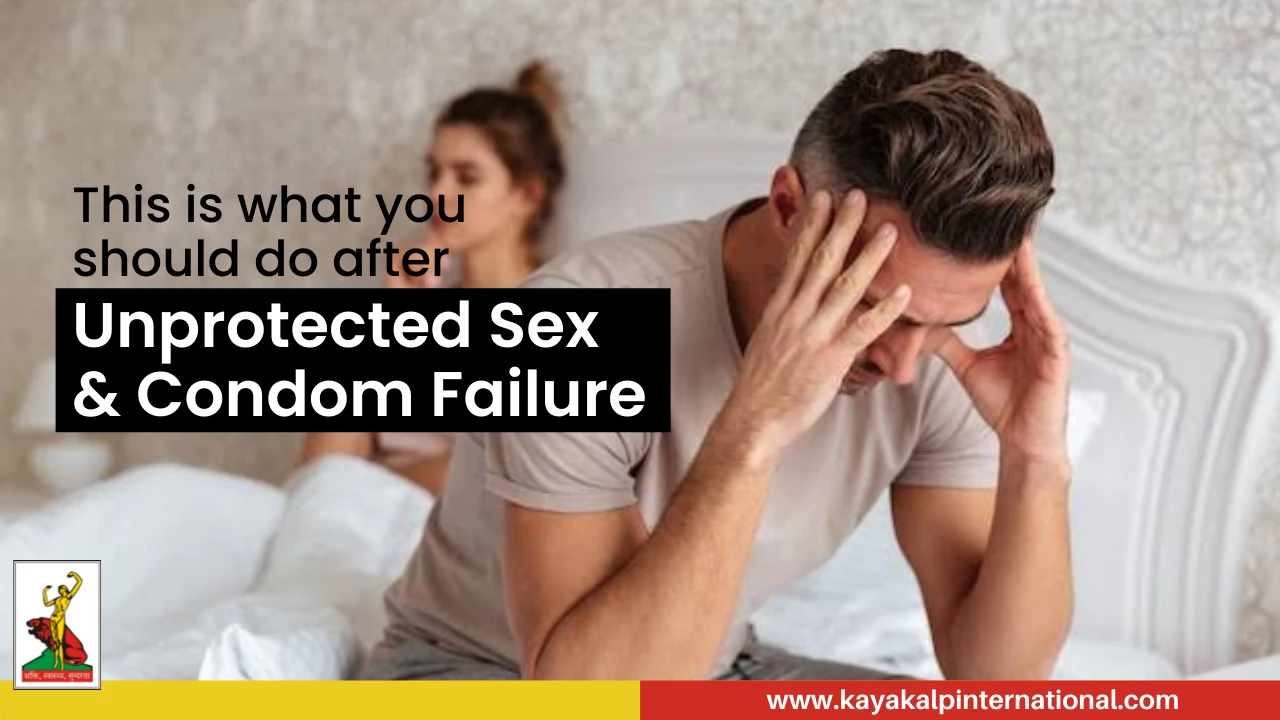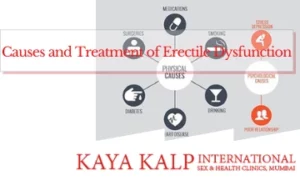Online sexologist in India says, If you’ve had sex without a condom or a sexual experience where the condom broke, try not to panic.
Things happen, and you’re far from the only person to go through either of these experiences.
What you do need to remember, though, is that there are a few risks associated with these sexual events.
You’ve probably heard about condoms — thin, tube-shaped pieces of latex or plastic that protects you during sex. When used correctly, condoms prevent pregnancy for almost 100% of people.
There are two different types of condoms:
Condoms that cover the penis (called an external or “male” condom)
Condoms that are inserted into the vagina or anus (called an internal or “female” condom)
Both types of condoms create a physical barrier between you and your partner. This can protect you from getting pregnant. It can also protect you from some but not all STDs (sexually transmitted diseases), including chlamydia, gonorrohea, trichomoniasis, and HIV (human immunodeficiency virus).
Though condoms are an easy and inexpensive way to protect you, they’re not perfect. Sometimes condoms break even when you do everything right.
But there are plenty of steps you can take to address those risks so that you remain protected and sexually healthy.
How can I tell when a condom breaks?
Let’s be honest: It can sometimes be hard to tell when a condom breaks, especially if it happens during sex. If you’re the person wearing the condom, you might be more likely to feel it break.
Here are some things you might see if it breaks:
- A hole or tear in the condom
- Semen (cum) leaking out of the condom
- Parts of the condom missing
Immediate Steps
If an external or internal condom breaks during sex, stop right then. You and your partner will need to consider a few questions:
- Is the external condom still on the penis or is it inside the vagina or rectum?
- Were you just starting to have sex or were you near ejaculation?
- Did the breakage happen after ejaculation?
If the condom broke after ejaculation, it’s possible that there was an exchange of semen or other bodily fluids. Try to remove as much semen from the vagina or rectum as soon as possible. You could try squatting and pushing as if you’re trying to have a bowel movement. You can also try sitting on the toilet and bearing down.
Afterward, you can gently wash the genital area with soap and water. Do not douche, scrub, or use a harsh cleanser or disinfectant.
What are the risks according to the online sexologist in India?
When a condom breaks, it means you may suddenly have more contact with your partner’s skin and body fluids than you expected. This can put you at risk for STDs and/or unwanted pregnancy.
- Pregnancy
A condom breaking during vaginal sex (penis-in-vagina) creates the risk of unwanted pregnancy, especially if the partner wearing the condom has already ejaculated. There’s still a risk if the partner hasn’t ejaculated, but it’s low.
- HIV and other STDs
If a condom breaks during oral, vaginal, or anal sex, it increases the risk of exposure to STDs.
Should I be worried if the condom broke?
If the condom broke, don’t panic. If you’re still in the middle of having sex, the first thing to do is replace the condom with a new, unbroken one.
After that, how much you should worry depends on whether or not you’re concerned about pregnancy and how likely it is that you or your partner have HIV or other STDs.
What to do if you’re worried about getting pregnant ?
If you’re worried about getting pregnant, you have three emergency contraception options.
- Levonorgestrel pill
A levonorgestrel pill, also known as a morning-after pill, can keep you from getting pregnant after a condom breaks. The most well-known brand is called Plan B, but there are many different brands.
This pill is available without a prescription, which means you can walk into a drugstore or supermarket and buy it without having to see a provider first. This is true even if you’re under age 18 and/or do not have an ID card.
Keep in mind: This pill needs to be taken within 3 days after unprotected sex. And it works best if taken as soon as possible. It also might not work as well if you have overweight or obesity (meaning your BMI is over 25).
- Ella pill
Ella (ulipristal) is another type of morning-after pill. It is more effective than levonorgestrel and can be taken up to 5 days after having unprotected sex.
Ella is only available with a prescription. This means you will need to see a doctor before you are able to take it. Ella might not work as well in people who have obesity (BMI over 30).
- Copper IUD
A copper IUD (intrauterine device) is a small device that is placed in your uterus to prevent pregnancy. It’s almost 100% effective at preventing pregnancy — as long as it’s put in place within the first 5 days after having unprotected sex. You will have to see a doctor to have an IUD inserted.
How soon should I take a pregnancy test after the condom broke?
A safe bet is to take a pregnancy test 3 weeks after having unprotected sex, or if your regular period is late, as soon as you realize.
Lets know from online sexologist in India – What to do if you’re worried about HIV?
If you think you’ve been exposed to HIV, you can take PEP (post-exposure prophylaxis). PEP is an emergency medication that’s taken after sex, to protect you from getting HIV.
Keep in mind that PEP has to be started within 3 days after having unprotected sex to work. It’s also only available with a prescription. This means you’ll need to talk to a provider or go to urgent care before you can take this medication.
How soon can I get tested for STDs after the condom broke?
Most STDs will show up on tests 2 to 3 weeks after you’re exposed. With some types of HIV tests, it takes up to 3 months for detection.
Remember that STDs often don’t have any symptoms. So testing is the only way to be sure you don’t have one.
Condoms, even unbroken ones, don’t do a good job at protecting you from STDs like HPV, herpes, and syphilis. If you’re having oral, anal, or vaginal sex, you should consider getting tested regularly — even if you never have a condom break.
How to Keep a Condom from Breaking
Use these tips to reduce the risk of a torn condom:
- Never use an expired external condom or one that has been stored in either hot or cold temperatures (such as a wallet or the glove compartment of a car).
- Don’t double up on external or internal condoms. Wearing two at once creates friction that can cause one of them to break.
- Never use oil-based lubricants, such as Vaseline, and avoid spermicides that contain nonoxynol-9. They can inflame vaginal and rectal tissues.
- Look for an approved water- or silicone-based lubricant and use lots of it.
- Use properly sized external condoms. An external condom that’s too big could slip off. One that’s too small is more likely to break.
- Never reuse an external or internal condom.
Whether you’ve knowingly had sex without a condom or experienced an accident with a condom, there are plenty of steps you can take to look after your sexual health and protect against pregnancy.
Keeping yourself protected on an ongoing basis is simple, too. All you need is a barrier method and reliable contraception.
There are however several other remedies that one can rely on if they wish to avoid any kind of unplanned pregnancy. But you need to understand that even though these remedies have worked for many, they cannot be completely effective. It is however always best to take precautions.
There are some methods of preventing pregnancy, which go hand-in-hand with the human body and medical science. Some of them are:
- Have Sex during Your Safe Period- This method provides an added layer of precaution if you already have some kind of protection in place. You can avoid the ovulation days, which usually occur two weeks before the period. A good way to go about it is to consult a fertility expert to track your ovulation days and schedule your intercourse accordingly.
- Practice the Start-Stop Method- The male partner can take care not to ejaculate inside his partner. This method requires practice, and there’s a risk that the sperm might somehow enter the vagina. Therefore, it’s better to do this along with other proven contraceptive methods.
- Track Your Basal Body Temperature- Once your period ends, you can start tracking your basal body temperature. When ovulation begins, the temperature starts rising and peaks is on the day of ovulation. You can avoid conception if you avoid sex during this period.
- Look Out for Cervical Discharge- A woman’s body produces a transparent, jelly-like discharge in the days leading up to ovulation. Abstaining from sex during this period can prevent ovulation.
The truth is that the natural contraceptive methods were used even during the Vedic age, that’s why we should turn to Ayurveda for safer and more effective options. It is always best to use something safe and free from hazardous effects. A few of the natural remedies have been mentioned below:
Neem: One of the most powerful herbs for preventing pregnancies is neem. Known as nimba in Ayurveda, neem leaves and oil can both be used effectively for deterring pregnancy. It is suggested to apply neem oil in the vagina before sexual intercourse. This will have a strong spermicidal effect for five hours. Research has also proven that neem oil destroys sperms cells completely barely after 30 seconds of contact.
Rock salt: Applying a paste made of Saindhav namak or rock salt mixed with til oil. Before coitus, this potent spermicidal paste can be placed inside the vaginal orifice to prevent pregnancy. The technique is safe and has no adverse effects on the female reproductive organs.
Turmeric: Its Ayurvedic name haridra, turmeric is an old tried-and-tested remedy for preventing pregnancy. Administering turmeric powder intra-vaginally reduces chances of fertilisation. A study conducted in 2011 also validates the claims that Curcumin in the turmeric, when administered into the vaginal orifice, it caused a block in sperm mobility.
Papaya: Some believe if you have unsafe intercourse, having papaya twice a day for the next 3-4 days may reduce the chances of an unwanted pregnancy. Some also believe that when the fruit is consumed by the male partner, it can reduce sperm count.
There are certain things you should keep in mind when you use any of the above home remedies:
- If you’re looking for an effective way to avoid pregnancy and are considering any one of the above methods on a long-term basis, consult an expert.
- Many of the herbs and foods listed above are neither 100% effective nor 100% free from side effects. Some carry risks that may prove harmful in the long run.
- If you experience any abnormal health effects after taking the remedy, stop taking it.
- Make sure you eat healthily while taking any birth control measures.
Online sexologist in India suggests you the home remedies to prevent unwanted pregnancy are not as effective as condoms, contraceptive pills or other medical contraceptive devices. Practicing safe sex is always the best option.
Consult your doctor so that you can proceed without anxiety or fear. After all, it’s always better to be safe than sorry.
Contact us personally and Know how to deal with unwanted pregnancy’s and get pro tips from best online sexologist in India. Lead happier sex life. Call on 9004393978 or fill in the below form to book an appointment with our specialists.




